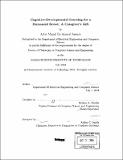Cognitive-developmental learning for a humanoid robot : a caregiver's gift
Author(s)
Arsenio, Artur Miguel Do Amaral, 1972-
DownloadFull printable version (58.94Mb)
Other Contributors
Massachusetts Institute of Technology. Dept. of Electrical Engineering and Computer Science.
Advisor
Rodney A. Brooks.
Terms of use
Metadata
Show full item recordAbstract
(cont.) which are then applied to developmentally acquire new object representations. The humanoid robot therefore sees the world through the caregiver's eyes. Building an artificial humanoid robot's brain, even at an infant's cognitive level, has been a long quest which still lies only in the realm of our imagination. Our efforts towards such a dimly imaginable task are developed according to two alternate and complementary views: cognitive and developmental. The goal of this work is to build a cognitive system for the humanoid robot, Cog, that exploits human caregivers as catalysts to perceive and learn about actions, objects, scenes, people, and the robot itself. This thesis addresses a broad spectrum of machine learning problems across several categorization levels. Actions by embodied agents are used to automatically generate training data for the learning mechanisms, so that the robot develops categorization autonomously. Taking inspiration from the human brain, a framework of algorithms and methodologies was implemented to emulate different cognitive capabilities on the humanoid robot Cog. This framework is effectively applied to a collection of AI, computer vision, and signal processing problems. Cognitive capabilities of the humanoid robot are developmentally created, starting from infant-like abilities for detecting, segmenting, and recognizing percepts over multiple sensing modalities. Human caregivers provide a helping hand for communicating such information to the robot. This is done by actions that create meaningful events (by changing the world in which the robot is situated) thus inducing the "compliant perception" of objects from these human-robot interactions. Self-exploration of the world extends the robot's knowledge concerning object properties. This thesis argues for enculturating humanoid robots using infant development as a metaphor for building a humanoid robot's cognitive abilities. A human caregiver redesigns a humanoid's brain by teaching the humanoid robot as she would teach a child, using children's learning aids such as books, drawing boards, or other cognitive artifacts. Multi-modal object properties are learned using these tools and inserted into several recognition schemes,
Description
Thesis (Ph. D.)--Massachusetts Institute of Technology, Dept. of Electrical Engineering and Computer Science, 2004. Includes bibliographical references (p. 319-341).
Date issued
2004Department
Massachusetts Institute of Technology. Department of Electrical Engineering and Computer SciencePublisher
Massachusetts Institute of Technology
Keywords
Electrical Engineering and Computer Science.